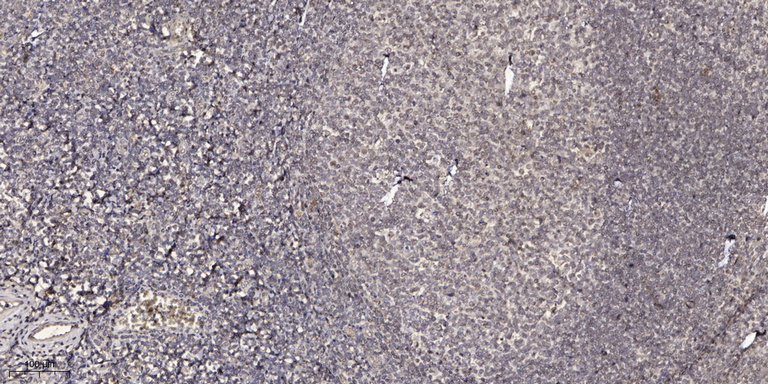CJ099 Rabbit Polyclonal Antibody
CJ099 Rabbit Polyclonal Antibody
- 产品详情
- 实验流程
Application
| IHC, IF |
|---|---|
| Primary Accession | Q6UWK7 |
| Reactivity | Rat, Human, Mouse |
| Host | Polyclonal, Rabbit,IgG |
| Clonality | Polyclonal |
| Calculated MW | 9173 Da |
| Gene ID | 387695 |
|---|---|
| Other Names | Protein GPR15LG, Antimicrobial peptide with 57 amino acid residues, AP-57, Antimicrobial peptide-57, Colon-derived SUSD2 binding factor, CSBF, Protein GPR15 ligand {ECO:0000312|HGNC:HGNC:31428}, Protein GPR15L, Secreted protein C10orf99, GPR15LG (HGNC:31428), C10orf99, GPR15L |
| Dilution | IHC~~1:100~500 IF~~1:50~200 |
| Storage Conditions | -20℃ |
| Name | GPR15LG (HGNC:31428) |
|---|---|
| Synonyms | C10orf99, GPR15L |
| Function | Highly cationic protein that has multiple functions. Acts as a chemotactic factor that mediates lymphocytes recruitment to epithelia through binding and activation of the G-protein coupled receptor GPR15 (PubMed:28900043, PubMed:28936214). May be a tumor suppressor; together with SUSD2 has a growth inhibitory effect on colon cancer cells which includes G1 cell cycle arrest (PubMed:25351403). May regulate keratinocyte proliferation (PubMed:29872130). In addition, through activation of Mas-related G protein-coupled receptors (MRGPRs) contributes to pruritogenesis by activating itch-selective sensory neurons and mast cells degranulation (PubMed:35704588). |
| Cellular Location | Secreted |
| Tissue Location | Expressed at high levels in colon, and cervix and at moderate level in tonsil (PubMed:25585381, PubMed:28900043). Highly reduced expression in primary colon cancer tissues compared with that in adjacent tissues (PubMed:25351403). Highest levels of expression detected in stomach and colon; expressed in epithelium of skin and esophagus, and in some tumor and/or tumor adjacent tissues (TAT), including TAT of esophagus cancer, hepatocellular carcinoma (HCC), squamous cell carcinoma (SCC), basal cell carcinoma (BCC) and invasive ductal carcinoma (IDC) tissues (at protein level) (PubMed:25585381) Highly expressed by inflammatory differentiated keratinocytese (PubMed:35704588). |
Research Areas
For Research Use Only. Not For Use In Diagnostic Procedures.
Application Protocols
Provided below are standard protocols that you may find useful for product applications.
终于等到您。ABCEPTA(百远生物)抗体产品。
点击下方“我要评价 ”按钮提交您的反馈信息,您的反馈和评价是我们最宝贵的财富之一,
我们将在1-3个工作日内处理您的反馈信息。
如有疑问,联系:0512-88856768 tech-china@abcepta.com.























 癌症的基本特征包括细胞增殖、血管生成、迁移、凋亡逃避机制和细胞永生等。找到癌症发生过程中这些通路的关键标记物和对应的抗体用于检测至关重要。
癌症的基本特征包括细胞增殖、血管生成、迁移、凋亡逃避机制和细胞永生等。找到癌症发生过程中这些通路的关键标记物和对应的抗体用于检测至关重要。 为您推荐一个泛素化位点预测神器——泛素化分析工具,可以为您的蛋白的泛素化位点作出预测和评分。
为您推荐一个泛素化位点预测神器——泛素化分析工具,可以为您的蛋白的泛素化位点作出预测和评分。 细胞自噬受体图形绘图工具为你的蛋白的细胞受体结合位点作出预测和评分,识别结合到自噬通路中的蛋白是非常重要的,便于让我们理解自噬在正常生理、病理过程中的作用,如发育、细胞分化、神经退化性疾病、压力条件下、感染和癌症。
细胞自噬受体图形绘图工具为你的蛋白的细胞受体结合位点作出预测和评分,识别结合到自噬通路中的蛋白是非常重要的,便于让我们理解自噬在正常生理、病理过程中的作用,如发育、细胞分化、神经退化性疾病、压力条件下、感染和癌症。






